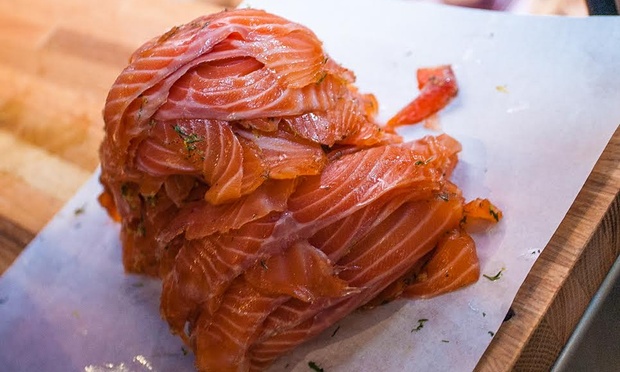Submission Guidelines
-
Submit only complete works, rather than outlines or pitches. We will not consider partially completed works.
-
Do not submit content that is promotional in any way. Any content that contains promotional elements or advertising will be rejected, unless you’ve received explicit authorization to do so. Please email alex@getnugg.com for specific inquiries.
-
Nugg accepts the following for consideration for publication on our blog: case studies, research, e-books, white papers, videos, checklists, how-to’s, tutorials, and more. If you are unsure whether your content is fit for publication, please email alex@getnugg.com
-
Nugg also accepts thought leadership columns and articles, and gives preference to original content that has not yet been published or distributed elsewhere.
-
When quoting others’ work, include attributions within the body copy following journalistic, Associated Press style. Do not include footnotes, endnotes or lists of references.
-
Include your name, address, company, title and e-mail address; if you are a Nugg user, please say so
-
You will receive an e-mail confirming your submission of online content.
-
Timeline for content review is dependent on current volume of submissions.
-
If your content is accepted for publication on the Nugg blog, you will be notified.
-
If your content is rejected, Nugg will make every effort to notify you. However, that may not always be possible.
-
Read the content submission guidelines carefully and include all content and files necessary for publication including images, videos, etc.
Additional Submission Information
- Nugg gives preference to original content that has not yet been published or distributed widely through other outlets.
- Editorial decisions to publish or not to publish content are made at the discretion of Nugg and are based on factors including but not limited to: relevance to the industry, interest to readers, timeliness and caliber of content. Nugg reserves the right to exercise its editorial judgment and reject any content at any time for any reason.
- Nugg generally re-writes all titles and subtitles to conform to our accepted style guide.
- Nugg supports the meaningful exchange of information to help create an environment that fosters the continuation of knowledge, thought leadership and a free exchange of ideas. Such an environment requires the authors of the AMA’s submissions/assigned stories to share their research findings and insights, if applicable, upon submission.
- The views expressed on the Nugg website, blog, and in our publications are those of the individual authors and do not necessarily reflect the official positions or policies of Nugg the company.
- None of the content that Nugg chooses to publish on the blog is influenced by advertisers, politicians, private or industry sponsors, members, donors, partners or collaborators.
- All Nugg publications staff members abide by the Society of Professional Journalists’ Code of Ethics, (Link) and all authors interested in writing for Nugg are urged to review and follow these guidelines for ethical and responsible editorial behavior.
Articles
- All articles must be submitted in Word format. PDFs will not be considered.
- All submissions are subject to be edited for accuracy, clarity, quality and length. While Nugg will make every effort to work with an author on any editing, we cannot not guarantee that authors will have an opportunity to review their work prior to publication due to time constraints.
- Include any applicable charts, graphs and images with your submission, but know that Nugg typically cannot run every chart, graph or image due to space constraints. Please provide applicable labeling and caption information with these submissions. It is the author’s responsibility to secure the publishing rights to any charts, graphs or images submitted. See image requirements below.
- References: If detailed attributions are necessary, please incorporate them into the text.
- Bios: The author biography should not exceed 50 words and should include: name, position, affiliation and an e-mail address where the author can be reached for more information.
- A headshot for the bio section should be included.
Will Hillary Clinton Ever Support Cannabis Legalization?
Leave a Comment
Throughout the past several months, cannabis reformers have been sizing up all of the candidates that have come crawling out of the woodwork to cast a bid for the presidential nomination. As with every major election, all of the groups currently working to change the marijuana laws in the United States are trying to get a grip on which candidate they should support in the 2016 campaign for the White House.
Some of these handicapping strategies are relatively simple, like understanding that Chris Christie and Marco Rubio, have no chance with the voters due to their verbal disdain over what is currently underway in regards to the cannabis trade. After all, the latest polls consistently show that the majority of the population supports legalization in some form or fashion. In addition, recent surveys have revealed that voters want the federal government to stay out of state marijuana laws. In other words, speaking out against the legalization of cannabis, or even better, threatening to shut down the industry, is not the smartest platform to take in this election.
Strangely, it is the Democratic candidates that have the cannabis nation a bit confused at this juncture. Right now, there is a great deal of support for Bernie Sanders who, while dragging his feet on offering a solid position on cannabis reform seems to wholeheartedly support putting an end to the drug war and also continuing to allow marijuana to do its thing in whatever states that are willing to have it. Because of this, Bernie Sanders is often viewed as the best bet for the next leader of the free world.
But, then there’s Hillary Clinton – the New York Senator and wife of former President Bill “I didn’t inhale” Clinton. She’s a candidate whose experience could certainly benefit the United States in many ways, but the problem is she seems skittish about sharing her views on one very important issue that voters want answers to this year: the legalization of marijuana.
Regardless of her slowpoke attitude, many pot proponents still want to side with Clinton because she is likable and seems to have the best odds at winning if another democrat is destined to control the Oval Office.
According to a recent article in Bloomberg Politics, the billion dollar cannabis industry is very curious about where Hillary Clinton stands on the issue of legal marijuana – mostly because industry leaders may have some funds to donate to buoy her campaign. However, before that happens, Hillary’s campaign needs to provide them with some indication on her official position and what she plans to do to or for the industry if she gets elected.
During a recent fundraiser in Portland, Oregon, where representatives from the state’s cannabis industry lined up to get a moment with the former first lady, Hillary Clinton said she had been working with Representative Earl Blumenauer on a number of issues, including “cannabis reform.” Hillary also suggested that she had discussed with Blumenauer the possibility of using marijuana legalization as part of her campaign platform, but that she was “still thinking about it.”
Unlike other candidates in the race, including Republicans Jeb Bush and Ted Cruz, Clinton really hasn’t said much about her views on cannabis. On one hand, she wants to take a “wait and see” approach to adult use cannabis in states that have already made it legal. On the other, she argues that there isn’t enough research to prove that medical marijuana is actually an effective treatment.
“Although I think for people who are in extreme medical conditions and have anecdotal evidence that it works, there should be availability under appropriate circumstances,” said Clinton. “But I do think we need more research, because we don’t know how it interacts with other drugs. There’s a lot we don’t know.”
Earlier this year, Clinton’s campaign refused a donation from the National Cannabis Industry, which has prevented her from capitalizing on fundraisers hosted by the organization that are responsible for generating insane amounts of money for other candidates, like Rand Paul.
On the flipside, during a recent campaign fundraiser hosted by Florida attorney John Morgan, the man bankrolling a large majority of the state’s medical marijuana initiative in 2016, Clinton apparently had some encouraging words in regards to her position on the legalization of cannabis that left him “very satisfied,” according to Bloomberg.
Representative Earl Blumenauer, the lawmaker responsible for a number of bills aimed at changing the course of prohibition in the United States, says that after spending some time with Clinton he believes she “would be at least as good, if not better” in regards to the issue of marijuana legalization than President Obama.
With the Iowa caucus set to launch the official election season in February, followed by primaries in New Hampshire the week after, Clinton is going to be forced to clarify her position on cannabis if she wants to compete with Bernie Sanders. Unfortunately, even if Clinton does speak out in favor of marijuana reform, it will not be enough to really mean much in the grand scheme of things. At this point, how can marijuana reformers really trust the validity of her voice will translate to her administration if she moves back into the White House in 2017?
It should be noted that the Clintons are infamous for flipping their stance on the marijuana-related issues. Last year, Bill Clinton said that legalization should be left up to the state and not the federal government. Yet, he attempted to penalize physicians for discussing medical marijuana with patients throughout his administration. So, while Hillary may be undecided at this point, it is not unreasonable to consider that her opinion is capable of swinging towards the more progressive side of the debate. If this happens, Hillary could easily become the cannabis industry’s candidate of choice, leaving Bernie Sanders in the cold.
Cannabis Takes on Alzheimer’s and Dementia
Leave a Comment
Alzheimer’s is the third most prevalent disease killer in the Western world after heart disease and cancer, and its rate of diagnosis continues to soar. In addition to the obvious cognitive dysfunctions, Alzheimer’s victims are dysfunctional with mundane matters and daily routines, have little or no recollection of close relatives and friends, and tend to be very grouchy and feisty.
A daughter tells the arduous caretaker story of helping her mother’s final stages of Alzheimer’s by getting her on medical marijuana and off pharmaceuticals in stages. Her mother, who arrived to her daughter’s Oregon home as she was approaching 80 years of age, was not the type who took advantage of holistic medicine and organic foods and supplements. In addition to her Alzheimer’s, she was on several other medications for other ailments.
But the crafty inclusion of some home cooked organic meals and cannabis produced very positive results with the mother’s cognitive abilities. The herb stews made her much more sociable and cooperative instead of feisty, angry, inappropriate and anti-social, which are all symptoms of Alzheimer’s, in addition to the gross absence of memory.
Her mother did pass away peacefully and lovingly at age 83 after the mother-daughter bond was firmly re-established. In other words, she exited the Earthly realm in a much better state than if she had not been exposed to cannabis.
Scientific Studies Support This Woman’s Story
A 2013 in vivo (mice) study in Spain, a vanguard for cannabis research, did a study on cannabis for Alzheimer’s entitled “CB2 cannabinoid receptor agonist ameliorates Alzheimer-like phenotype in AβPP/PS1 mice.”
The researchers concluded that:
“… the present study lends support to the idea that stimulation of CB2 [cannabinoid] receptors ameliorates several altered parameters in Alzheimer’s disease such as impaired memory and learning, neuroinflammation, oxidative stress damage and oxidative stress responses, selected tau kinases, and tau hyperphosphorylation around plaques.”
But that’s not the only Alzheimer’s study of recent that has come to similar conclusions. Researchers who worked on a study published in Molecular and Cellular Neuroscience came up with the most advanced understanding of Alzheimer’s mechanics and how cannabis demonstrates efficacy without toxic side effects. Their study was preceded by similar onesshowing cannabis efficacy for Alzheimer’s.
Gary Wenk, Ph.D, professor of neuroscience, immunology and medical genetics at Ohio State University, told Time Magazine:
“I’ve been trying to find a drug that will reduce brain inflammation and restore cognitive function in rats for over 25 years; cannabinoids are the first and only class of drugs that have ever been effective.”
Let’s hope our brain dead, oppressive government and medical system wakes up to raw cannabis’s medical potentials.
Paul Fassa| Naturalsociety| 16th Aug 2014
Here’s How Marijuana Affects Anxiety
Leave a Comment
A lot of people use marijuana to treat anxiety, finding an almost immediate sense of relief and relaxation after smoking pot. But for others, marijuana use heightens anxiety. It can cause paranoia and produce a completely different set of feelings. To some extent, just about everyone experiences this psychological response when they start smoking, but though these responses appear to vary between individual users, research shows that marijuana can be an effective treatment option for anxiety sufferers.
The relationship between cannabis and the brain is complex but largely complementary; components of marijuana, known as cannabinoids, naturally respond to parts of our brain associated with pain management, mood, and anxiety (to name a few). Humans have natural endocannabinoid systems that regulates anxiety, and when certain cannabinoids are introduced to the body, they have been shown to significantly reduce anxiety.
A 2014 study published in the journal Neuron demonstrated this point. Researchers at Vanderbilt University set out to analyze the effectiveness of self-medicating with marijuana to treat anxiety, and they found compelling reason to believe that people who used the substance in this manner were onto something.
“Chronic stress or acute, severe emotional trauma can cause a reduction in both the production of endocannabinoids and the responsiveness of the receptors,” the researcherswrote in a press release about the study. Because components of marijuana function as endocannabinoids, cannabis can, in fact, provide relief by contributing to the system—centrally located in the amygdala—that regulates anxiety, they continued.
“We know where the receptors are, we know their function, we know how these neurons make their own cannabinoids,” Dr. Sachin Patel, lead author of the study, said. “Now can we see how that system is affected by… stress and chronic [marijuana] use? It might fundamentally change our understanding of cellular communication in the amygdala.”
The research proved so convincing that Francis Collins, the director of the National Institutes of Health, wrote a blog post about it on the federal agency’s website, stating that Patel’s study “suggests that THC and/or other external cannabinoids found in marijuana may also serve to reduce anxiety by binding to CB1 receptors in the amygdala, rendering neurons less active.”
Collins went on to say that further research was needed and he cautioned against chronic marijuana use, especially for teenagers who might be experiencing high levels of anxiety and might be experimenting with cannabis as a potential treatment option. But still, the blog posts arguably reflect shifting attitudes—even at the federal level—regarding the medicinal value of marijuana for mental health.
WHAT ARE THE TREATMENT LIMITATIONS?
Some people experience adverse psychological effects after smoking pot, of course. Even seasoned stoners sometimes feel paranoid and anxious after smoking too much or eating potent, cannabis-infused edibles. Moderating use and selecting strains of cannabis that are commonly recommended for anxiety treatment (i.e. indicas) can help reduce the risk of having an unpleasant experience with pot, but that advice is based on anecdotal evidence.
That said, more research really is needed. Approximately 3.3 million Americans suffer from anxiety, according to the Anxiety Disorders Association of America. It can be a debilitating disorder that affects how people socialize and cope with daily stress. And though there are pharmaceutical options available—including benzodiazepines such as Xanax—the fact of that matter is, those drugs are highly addictive and dangerous. Marijuana is non-toxic and non-addictive, and it is still an effective form of treatment.
By: Kyle Jaeger
What Makes Some Marijuana Purple?
Leave a Comment
So, what makes some marijuana purple? It’s an interesting question to ask since not everyone realizes what exactly makes their strains purple. What is also interesting is that some individuals have asked the question, “Is purple weed better?”
In a new video by StrainCentral, Josh talks all about purple cannabis in response to a question he received in the comments section that asked if purple cannabis is better than other cannabis. In “Is Purple Weed Better (Weed Myths #2)” – Josh breaks down what exactly makes some marijuana purple. If you’re an experience grower, there’s a pretty good chance you know exactly what makes some marijuana purple.
If you enjoy Josh’s video, definitely check out his video where he reviews how different the “high” is when you drink cannabis compared to other methods of consumption. At Josh’s request (and our approval), sit back and smoke, dab, or vape along and learn what makes some marijuana purple!
High Dining: THC Infused Salmon
Leave a Comment
Sliced thin with flecks of dill peeking out, the salmon looks like any other of gravlax you would have for brunch. But put it on a bagel with a schmear of cream cheese, and you will get pretty stoned eating this delicacy.
The mastermind behind the THC infused salmon – cured in salt, dill, lemon, sugar and a weed tincture – is Josh Pollack, owner of Rosenberg’s Bagels and Delicatessen in Denver.
“I love bagels and lox, and I love cannabis,” Pollack said.
Pollack, a New Jersey native who grew up going to establishments like Russ and Daughters, moved to Colorado for college. He loved the state, but missed the bagels from back east. After graduating, he worked in finance for a while, but tired of that and moved on to a more fulfilling passion: food.
“I’ve always been food obsessed,” Pollack said. “Bagels and lox has always been a comfort food.”
It was tough to find his favorite comfort food, so specific to the New York and New Jersey area, in Denver. So last year, Pollack opened Rosenberg’s Bagels and Delicatessen to serve up classics like bagels and lox.
The idea to infuse salmon with a weed tincture came about as a “fun little thing to do” for the 4/20 “stoner holiday”, as Pollack called it, earlier this year. It was a hit.
“It puts two things that people really love together,” he said. “That’s why I did it. There were people freaking out when they heard about it.”
The first batch of THC-infused salmon, which Pollack and his team passed out to people at a 4/20 event, was a little strong, making it difficult for people to eat a whole bagel covered in the stuff. Through trial and error, Pollack and his team at Rosenberg’s have figured out the right proportion of weed to salmon.
According to Colorado marijuana regulations, edibles sold recreationally must be wrapped individually or distributed in increments of no more than 10 milligrams of activated THC. To meet this law, which Pollack said is a “safe point” for most people, every three ounces of fish – the ideal serving amount for a bagel – should contain 10 milligrams of the tincture.
Pollack is still in the process of perfecting the dish, and said he has gotten more calculated each time they make a batch.
Pollack can’t currently sell the special salmon, but once he perfects the proportions, he hopes to sell it through local dispensaries. Unlike other edibles, salmon is “not a particularly shelf stable product”, so he said he will likely sell it on a special order basis.
The process of giving the salmon what Pollack calls a “tiny herbaceous flavor” is similar to the way he cures all the salmon for his delicatessen. First he makes a tincture by soaking weed in strong alcohol, straining it out and cooking the alcohol out of the remaining green liquid without activating the THC. Then, he adds the tincture to the recipe used for the cure recipe the delicatessen uses on all gravlax – a mixture of spices and a little bit of alcohol that acts as a retaining agent.
The salmon dries in the fridge for 72 hours to let the flavor disperse throughout the flesh and form a hard outer shell, and is then topped with lemon and dill.
“With this application, it goes really well to appropriately mask the flavor of the cannabis,” Pollack said. He said people like it because most edible products are brownies or candies – sweets filled with sugar that don’t really hide the flavor of cannabis, which not everyone likes. Savory items infused with weed, though on the rise, are still rare.
Now, Pollack is working on a new batch of gravlax for the Harvest Gathering, a Jewish food event in Colorado at the end of September, where he plans to teach Jewish chefs how to cook with cannabis. Lox isn’t the only Jewish food Pollack is currently infusing with weed; he’s also trying his hand at matzah ball soup, made with cannabis-infused schmaltz.
“Anything you can cook with fat, you can cook with cannabis,” he said.
Ronda Rousey Takes Stand Against Drug Testing For Marijuana
Leave a Comment
Ronda Rousey is standing up to the Nevada State Athletic Commission (NSAC) after they decided on Monday to suspend UFC fighter Nick Diaz for five years for apositive marijuana test.
“I’m sorry, but it’s so not right for him to be suspended five years for marijuana,” Rousey said on Wednesday at a UFC press conference in Melbourne, Australia.
Diaz’s suspension is a result of him testing positive for marijuana for a third time. Lots of people think the suspension is ridiculous. But Rousey, a close friend of Diaz’s, took it one step further on Wednesday, saying she doesn’t think marijuana use should be penalized at all.
“I’m against testing for weed at all. It’s not a performance enhancing drug. And it has nothing to do with competition. It’s only tested for political reasons,” she said.
https://youtu.be/pgjdhAYZOXE
Spot on, Ronda. Although marijuana is on the World Anti-Doping Agency’s Prohibited List, the advantages it can offer athletes during a competition are, by WADA’s own admission, limited to “better focus” and “diminished stress.”
Diaz and many more athletes who regularly smoke marijuana use the drug for non-competitive recreational purposes. Diaz himself is a card-carrying medical marijuana patient in California. But in making its decision, the NSAC effectively stripped away all context behind Diaz’s possible marijuana usage, charging him like a cheater when he’s really just another fighter in pain — a point that infuriated Rousey on Wednesday.
“If one person tests for steroids, that could actually hurt a person, and the other person smokes a plant that makes him happy, and he gets suspended for five years. Whereas a guy who could hurt someone gets a slap on the wrist. It’s not fair,” Rousey said, also adding that she believes marijuana testing is an invasion of privacy.
Perhaps more perplexing: If Diaz had been caught actually taking steroids instead of marijuana, he would have been subjected to a much shorter suspension.
Petty politics within the NSAC may have been behind Diaz’s trumped-up suspension too. The NSAC’s Pat Lundvall reportedly pushed for a lifetime ban against Diaz despite the organization’s own guidelines suggesting a three-year ban for a third positive marijuana test.
Lundvall’s reason for motioning for a lifetime ban? She felt disrespected by Diaz, a fighter who’s never stained the integrity of the sport by testing positive for steroids, and whose harmless marijuana use was for relaxation and pain-relief purposes — a more than understandable choice, especially considering the dangers of pain-killing and anxiety-relieving prescription drugs in certain cases.
Taking all of this into consideration, Rousey was defiant in her support for Diaz and her disdain for marijuana testing, closing out her speech by declaring, “I think we should free Nick Diaz.”
By Justin Block
Since Colorado Legalized Marijuana, Highway Fatalities are Way Down
Leave a Comment
One of the boogiemen of legalizing a previously banned substance is that fear that our streets will become populated by drug-addled drivers, plowing into family station wagons and school buses. Opponents to legalizing marijuana point to studies that show increases in drivers testing positive for marijuana while driving. Proponents of ending the prohibition on marijuana point to similar studies showing that these people testing positive for marijuana are usually in trouble because they are also drunk-driving. Radley Balko, over at the Washington Post has put together some interesting findings concerning driving fatalities in Colorado, since they legalized pot in 2012:
As you can see, roadway fatalities this year are down from last year, and down from the 13-year average. Of the seven months so far this year, five months saw a lower fatality figure this year than last, two months saw a slightly higher figure this year, and in one month the two figures were equal. If we add up the total fatalities from January through July, it looks like this:
Here, the “high” bar (pardon the pun) is what you get when you add the worst January since 2002 to the worst February, to the worst March, and so on. The “low” bar is the sum total of the safest January, February, etc., since 2002. What’s notable here is that the totals so far in 2014 are closer to the safest composite year since 2002 than to the average year since 2002. I should also add here that these are total fatalities. If we were to calculate these figures as a rate — say, miles driven per fatality — the drop would be starker, both for this year and since Colorado legalized medical marijuana in 2001. While the number of miles Americans drive annually has leveled off nationally since the mid-2000s, the number of total miles traveled continues to go up in Colorado. If we were to measure by rate, then, the state would be at lows unseen in decades.
That’s good news. Even for people against the legaliztion of marijuana, they should be happy that fewer people are dying on the highways—even if this correlation is not a causation. Some people believe that there is a causation in these numbers as (proponents argue) the legal option of getting high on marijuana can replace, in some cases, getting high on alcohol, and driving while high is probably less dangerous than driving while intoxicated on alcohol.
No doubt there are myriad other reasons for the decrease in road fatalities—better cars with better safety features. The important point is that the numbers are down, and while these numbers may have nothing at all to do with the legalization of marijuana, the belief that marijuana legalization might lead to tons of terrible driving accidents, so far, is unwarranted.
By
Hundreds of Psychedelic Doors Photographed by Agne Gintalaite
Leave a Comment
Lithuanian artist Agne Gintalaite has always been attracted to the “garage towns” of her native Lithuania—large areas filled with storage units for cars that were terribly inconvenient and often bus rides away from the owners’ homes. In her series Beauty Remains, Gintalaite explores the multitude of garage doors she has discovered on her explorations, the brightly colored wooden and metal doors that look as if time has tried to claw them to pieces, yet their vibrancy withstands each passing year.
Her project began after a recent trip to IKEA revealed a sprawling garage town near the megastore filled with hundreds of examples of these doors that outlasted the time when IKEAs were nowhere to be found. “By documenting these objects that are, most likely, about to disappear from Lithuanian society, I wished to communicate to the viewer the ambivalent, aesthetic, but also human significance of these garage doors,” said Gintalaite. “Beautifully painterly, these doors do not need be explained to the beholder. It is the fascinating play of colour and texture that I attempted to capture with my camera.”
In documenting these doors the artist also found herself documenting human dignity as the owners continue to hold onto their property in areas in which big businesses increasingly impede on the urban landscape. “As long as they last,” said Gintalaite, “this uncanny beauty remains.”
Gintalaite received her BA in Art History and Theory from Vilnius Academy of Arts in Lithuania, and is currently a freelance photographer and art director. You can find more of her work on her Tumblr and Behance. (via My Modern Met)
Colossal by Kate Sierzputowski







